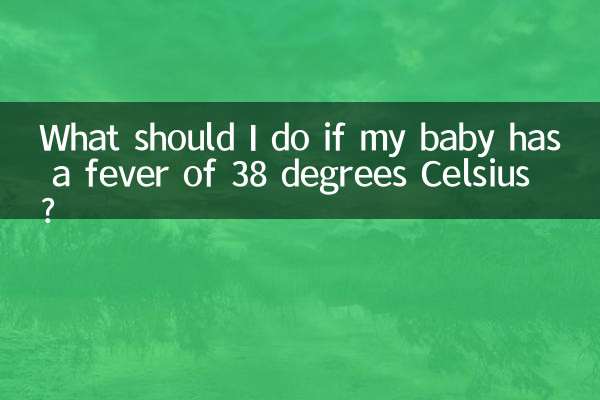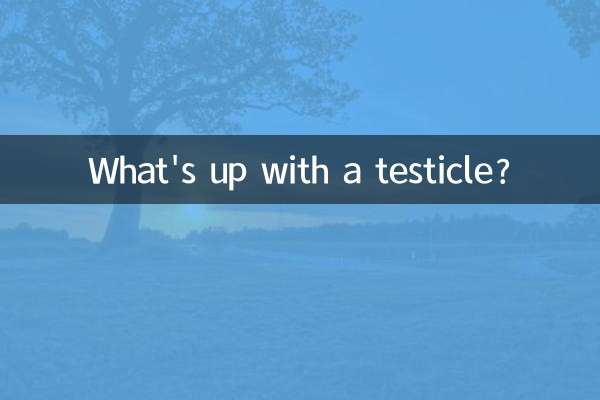What should I do if my baby has a fever of 38 degrees Celsius? ——Care guide that parents must know
Recently, the topic of infant and child health care has been very popular across the Internet, especially the search volume of discussions related to "baby fever" has surged on major parenting platforms. The following is the statistics of hot topics in the past 10 days:
| Ranking | Hot search keywords | Search volume (10,000) | Main discussion platform |
|---|---|---|---|
| 1 | Baby heat treatment | 128.6 | Xiaohongshu/Douyin |
| 2 | Do you need medical attention at 38 degrees? | 95.2 | Baidu/WeChat |
| 3 | Physical cooling method | 76.8 | Zhihu/Weibo |
| 4 | Selection of antipyretics | 63.4 | Baby Tree/Mom Network |
1. What is the fever level of 38.3℃?

According to clinical standards, the body temperature classification of infants and young children is as follows:
| body temperature range | Fever level | Handling suggestions |
|---|---|---|
| 36.5-37.5℃ | normal | routine care |
| 37.5-38℃ | low fever | Observation + physical cooling |
| 38-39℃ | moderate fever | Physical cooling + drug intervention |
| >39℃ | high fever | seek medical attention immediately |
2. Five steps for emergency treatment
1.Accurate temperature measurement: Use an electronic thermometer to measure armpit temperature (requires +0.5℃) or ear temperature. Avoid using mercury thermometer to prevent rupture.
2.environmental regulation: Keep the room temperature at 25-26℃, the humidity at 50%-60%, and wear breathable cotton clothing
3.physical cooling: Wipe the neck, armpits and groin with warm water (32-34℃). Do not use alcohol.
4.Hydration solution: Increase breastfeeding for infants within 6 months, and supplement oral rehydration salt for older infants
5.drug use: If the body temperature of infants over 3 months old is >38.5°C, antipyretic drugs may be considered (specific medication needs to be prescribed by a doctor)
3. Medication precautions
Comparative data on popular antipyretic drugs:
| Drug name | Applicable age | Onset of effect | duration | Common dosage forms |
|---|---|---|---|---|
| Acetaminophen | >3 months | 30-60 minutes | 4-6 hours | Drops/suspension |
| Ibuprofen | >6 months | 15-30 minutes | 6-8 hours | Suspension/Suppository |
4. 7 situations in which medical treatment is necessary
1. Infants under 3 months old have fever >38℃
2. Fever lasts for more than 72 hours
3. Convulsions and confusion
4. Accompanied by projectile vomiting
5. Purple-red ecchymosis appears on the skin
6. Refusing to eat or significantly reducing urine output
7. Have basic diseases such as congenital heart disease
5. Analysis of common misunderstandings
1.Cover sweat to reduce fever: It may cause febrile convulsions. The correct approach is to reduce clothing appropriately.
2.Apply ice to cool down: Can cause chills and heat production, it is recommended to use warm water for bathing
3.Alternate medication: Latest guidelines do not recommend alternating use of acetaminophen and ibuprofen
4.Antibiotic abuse: Common viral infections do not require antibiotics
6. Nutritional supplement suggestions
Diet adjustment plan during fever:
| food type | Recommended food | Things to note |
|---|---|---|
| liquid food | Rice water/breast milk/formula milk | Feed small amounts frequently |
| semi-liquid food | Porridge/pure | Suitable temperature |
| vitamin supplement | Fruits high in vitamin C | Avoid overly acidic stimulation |
According to the latest pediatric expert consensus, 38.3°C is a moderate to low-grade fever that requires close observation. Parents should stay calm, monitor and record body temperature (it is recommended to measure it every 2 hours), and observe the baby's mental state at the same time. If the body temperature does not drop within 24 hours after taking corrective care, it is recommended to seek medical treatment in time to investigate the cause.

check the details

check the details